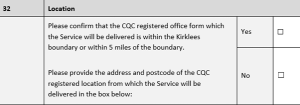Table of Contents
Article Details
As part of a new suite of public procurement regulations introduced by the Procurement Act 2023, certain contracts can be reserved for ‘local’ suppliers.
The Procurement Act 2023 allows contracting authorities to reserve below-threshold contracts for local suppliers, as well as SMEs and VCSEs. As part of reviewing hundreds of tender requirements, Executive Compass have noticed this being leveraged more prominently in recent months – particularly in contracts for health and social care.
Why are some contracts being reserved for local suppliers?
The government believes contracts being reserved for local providers or suppliers will:
- Boost local economies, support the local tax base and keep money circulating within the community – ensuring residents benefit from contract award
- Enhance supply chain resilience as shorter, more locally based supply chains are less vulnerable to international disruptions – for instance, the conflict in Ukraine
- Improve responsiveness, which can be beneficial in meeting KPIs under the contract, such as those mandated under Awaab’s Law.
Overall, the provision is part of a wider effort to localise public sector supply chains and removing potential ‘barriers to entry’ for SME participation. This is formalised in the Procurement Act 2023 and PPN 005:
Procurement Act 2023
Most importantly, this feature is enshrined in the overarching legislation of public procurement. Section 116 includes a provision which allows local authorities to ‘disapply’ regulations under Section 17 of the Local Government Act 1988.
Typically, this is intended to permit reservation or prioritisation of below-threshold contracts to suppliers located in a specific county or London borough.
PPN 005
Further to the above, PPN 005 provides further guidance on when in-scope organisations (e.g. central government departments and arms-length bodies) can consider options in below-threshold contracts:
- ‘[Reserving] the procurement by supplier location. This means being able to run a competition and specify that only suppliers located in a geographical area can bid.’
- ‘[Reserving] the procurement for small and medium sized enterprises and voluntary, community and social enterprises.’
Contracting authorities are encouraged to consider this on a case-by-case basis – for example, in local areas which have an outsized dependency on the public sector for employment.
What are the potential drawbacks and benefits to reserving contracts?
When applied properly, prioritising below-threshold contracts for local suppliers reallocates public spend to local businesses and VCSEs, retaining jobs and skills within communities. However, as outlined below, certain drawbacks also apply:
| Benefits to reserving contracts for local suppliers | Drawbacks to reserving contracts for local suppliers |
|
|
Notably, small- and medium-sized businesses could constrain their opportunities to expand into and do more business with the public sector. As an example, a recent care tender from Kirklees Council included the following as part of the conditions of participation:

Figure 1 – pass/fail question in the Procurement Specific Questionnaire
In practice, this means that smaller suppliers on the outer eastern outskirts of Bradford – the nearest large city – would be excluded from the procurement, despite only being a 20-minute drive from Kirklees.
How will this inform future bid strategies?
If, going forward, contracting authorities continue to reserve contracts for local suppliers at a greater ratio, suppliers will need to react accordingly.
Suppliers
- Demonstrate a local presence by mentioning your operational base, community links and local workforce as part of the submission, echoing the buyer’s preferred outcome
- Check the tender guidance and conditions of participation carefully to ensure you are eligible to bid, to avoid your tender being disqualified
- Highlight the wider benefits of contract award in quality responses, such as retaining local skills and employment or recirculating contract spend within the local area.
Contracting authorities
- Consider greater pre-market engagement as provided under the Procurement Act 2023, ensuring that the eligibility criteria are identified in market engagement notices
- Conduct market testing to ensure there are a reasonable amount of high-quality suppliers in the area to deliver against the requirements of the contract
- Demonstrate rationale for reserving the contract in the tender documents or as part of the clarification logs – for instance, if response times are a critical part of the contract. This will mitigate the risk of the conditions of participation being challenges and the tender process being delayed or annulled.
To find out more about how we can support you with a tender submission in addition to identifying potential qualifying criteria, contact us today at info@executivecompass.co.uk or 0800 612 5563.
